SERP APIs are crucial tools for various SEO-related and analytical tasks in businesses. They extract useful search engine results and feed them into your applications without the need to develop or maintain a complex infrastructure. So, what are the best SERP APIs you should consider to retrieve precise Google results? Let’s discover them all in this article!
What is a SERP API?

A SERP API stands for Search Engine Results Page Application Programming Interface. This tool automatically extracts and parses data from search engine results by converting it into a structured format, like JSON. Think of it like a bridge connecting your application or platform with a search engine’s database.
SERP APIs benefit SEO specialists, market researchers, or those who need to track search engine rankings, observe market trends, analyze competitors, and implement other marketing activities. With SERP APIs, these professionals can stay away from manually gathering and analyzing important data (e.g., keyword rankings, competitor activities, and market trends) and enhance the accuracy of scraping data.
How Do SERP APIs Work?
To let a SERP API scrape search engines as expected, you first need to integrate the API into your application or platform through the provider’s code library or endpoint. Then, you’ll specify the keyword(s) you want to track and search settings (e.g., search engines, location, or device type). Once you’ve done these steps, it’s time for the SERP API to work behind the scenes:
- After receiving your query, the SERP API uses your chosen keywords and search engine parameters to simulate an actual search. One important feature the SERP API uses to avoid being blocked by search engines is proxy networks (which means different IPs across regions). Proxies enable the API to:
- Rotate IPs for each request to keep individual IPs from being flagged by search engines.
- Simulate real user searches from various devices and locations to get specific results.
- Remain reliable at scale, even when handling millions of queries.
- Upon searches, the API retrieves the raw HTML of the SERP and captures everything therein, like organic listings, featured snippets, or maps.
- Instead of giving you messy raw HTML, the API parses and cleans the data by transforming it into structured formats like JSON. This step is crucial to ensure the data is easily incorporated into your application.
Benefits of Using a SERP API?
Your business should consider using SERP APIs to scrape search engines for several reasons:
- Scalability: Without SERP APIs, your business has to develop and maintain its own scraping system. This means monitoring proxies, handling IP bans, updating your scrapers when search engines change their layouts, and investing in servers. When your search demand increases, the complexity and costs grow accordingly. But with SERP APIs, you can send a large volume of search queries daily, and the provider’s infrastructure takes over the heavy lifting. You don’t even need to spend lots of money and time to deal with the increasing number of requests.
- Accuracy: SERP APIs allow you to extract reliable SERP data with high accuracy levels. Whether your queries target organic results, featured snippets, specific devices, or anything else, SERP APIs work reliably to return exactly what you want. This benefits those who want to access accurate SERP data in real-time. The providers also frequently update their APIs to adapt to a search engine’s algorithm and layout changes. This ensures the APIs will always extract precise data.
- Compliance: Search engines typically don’t want you to scrape their result pages directly. So, they often set up protection methods (like IP blocking, rate limits, or CAPTCHA) to prevent abusive or uncontrolled scraping that could negatively affect their servers or violate terms of service. SERP APIs, however, are designed to handle these obstacles by operating in a safe and compliant way. For example, they format the data into clean JSON or other structured outputs, use large proxy pools, and handle CAPTCHA at scale. This helps your business stay compliant and avoid blocked IPs or legal risks.
Top 10 SERP APIs for Accurate Google Results
If you want to facilitate data scraping, which SERP APIs should you rely on to get accurate Google results? Our curated list in this section will give you an overview of the best SERP APIs, along with their ease of use, accuracy, scalability, pricing models, and unique selling points. But first, let’s take a quick look at the comparison table to understand their key differences:
Comparison Table of Best SERP APIs
| SERP APIs | Supported search engines | Google SERP coverage | Pricing model (per request / monthly) | Free tier availability | Best suited for |
| SerpApi | Google, Amazon, Baidu, Bing, DuckDuckGo, Ebay, Naver, etc. | Featured snippets, ads, maps, videos, shopping results, etc. | Start from $75/month | Yes, for 250 searches/month | Developers and businesses |
| DataForSEO | Google, Yahoo, Bing, Baidu, YouTube | Organic, images, news, maps, ads, etc. | API-based pricing with at least $0.0006/SERP page (but the minimum payment of $50 is required) | No, but DataForSEO offers a free unlimited trial to test its APIs | Digital marketers, SEO specialists, and businesses |
| Zenserp | Google, Bing, YouTube, Yandex | Organic, news, videos, maps, etc. | Start from $49.99/month | Yes, for 50 searches/month | Developers and businesses |
| Apify SERP Scraper | Google, Bing, Yahoo, Baidu, etc. | Organic, paid results, AI overviews, ads, related queries, suggested results, etc. | Start from $39/month | Yes, including $5 worth of usage credits per month and basic access | SEO specialists, digital marketers, and market researchers |
| Bright Data (formerly Luminati) | Google, Bing, Yandex, DuckDuckGo, Baidu | Organic & paid results, shopping results, maps, images, reviews, etc. | Start from $1.5 for 1K results | No, but Bright Data offers a free trial | Developers and businesses |
| Oxylabs SERP Scraper API | Google, Baidu, Bing, Yandex | Organic & paid results, ads, images, flights, hotels, suggestions, maps, etc. | Start from $49 + VAT/month | Yes, with 2K results | Developers and businesses |
| ScraperAPI | Google, Amazon, Ebay, Walmart, Redfin | Organic & paid results, news, maps, products, etc. | Start from $49/month | No, but ScraperAPI offers a 7-day free trial with 5,000 API credits | Developers and businesses |
| Netnut | Google, Bing | Keywords, ads, news, images, etc. | Start from $3.82/month | No, but Netnut offers a 7-day free trial | Businesses that want to implement large-scale SEO and market analysis projects |
| SearchApi.io | Google, DuckDuckGo, Naver, Bing, Yahoo, Baidu, etc. | Organic results, knowledge graph, ads, news, maps, “People Also Ask,” etc. | Start from $40/month | Yes, with 100 free requests upon account registration | Developers, digital marketers, SEO specialists, and businesses |
| Scrapingdog | Google, Bing Search, Amazon, etc. | Organic & paid results, ads, news, etc. | Start from $40/month | Yes, with 100 free requests upon account registration | Developers and business users |
1. SerpApi
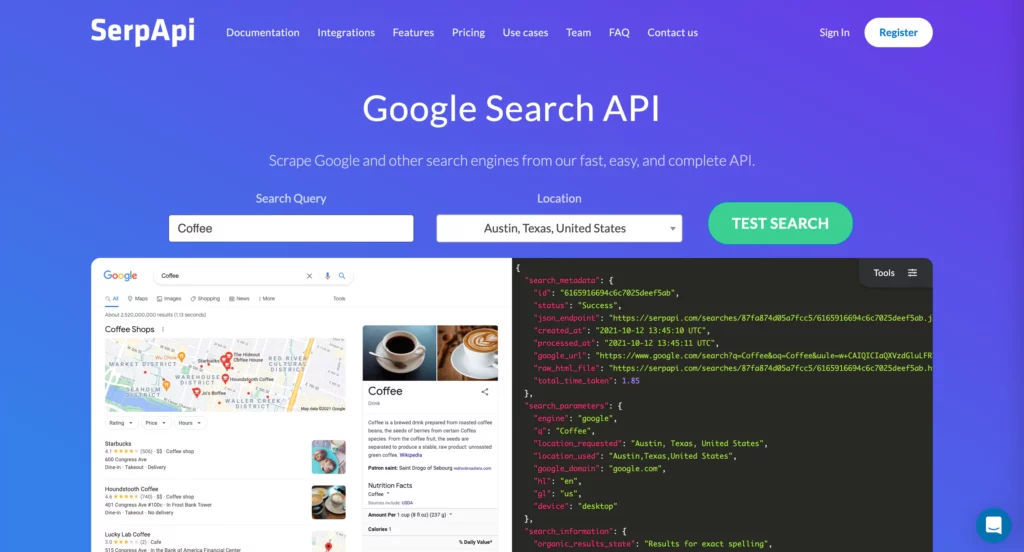
SerpApi is considered friendly to developers. It offers a polished API playground, as well as SDKs and ready-to-use code in different programming languages (e.g., Python, Ruby, or JavaScript). You can easily integrate the API into your platform by leveraging one of their libraries in your preferred language or copying and pasting the following code:

Whether you want to retrieve featured snippets, ads, videos, maps, shopping results, or any useful data, SerpApi gets you covered. The best part of SerpApi here is it transparently handles CAPTCHAs, proxies, and other technical scraping problems on your behalf. In particular, it uses real browsers (not just scripts) to open search engines like Google, which makes results look exactly like what humans see. It also offers CAPTCHA-solving technology to get through Google’s attempt to block automated access (if needed). Further, it delivers you well-organized data in JSON for easy use and analysis.
SerpApi also integrates unique advanced features to support data scraping as follows:
- The service provides built-in retry logic and anti-block infrastructure to process high-volume workloads reliably.
- It allows you to choose a location parameter (e.g., “Austin, Texas, USA” or “Oulu, Finland”) and routes your request through the nearest server to that location to get accurate results.
- SerpApi protects its US-based customers by taking on the legal liability for extracting public search results.
Pricing
- Free plan for 250 searches/month
- Developer at $75/month for 5,000 searches (no US Legal Shield)
- Production at $150/month for 15K searches (including US Legal Shield)
- Big Data at $275/month for 30K searches (including US Legal Shield)
- Enterprise: tailored plans depending on your custom volume and requirements.
2. DataForSEO
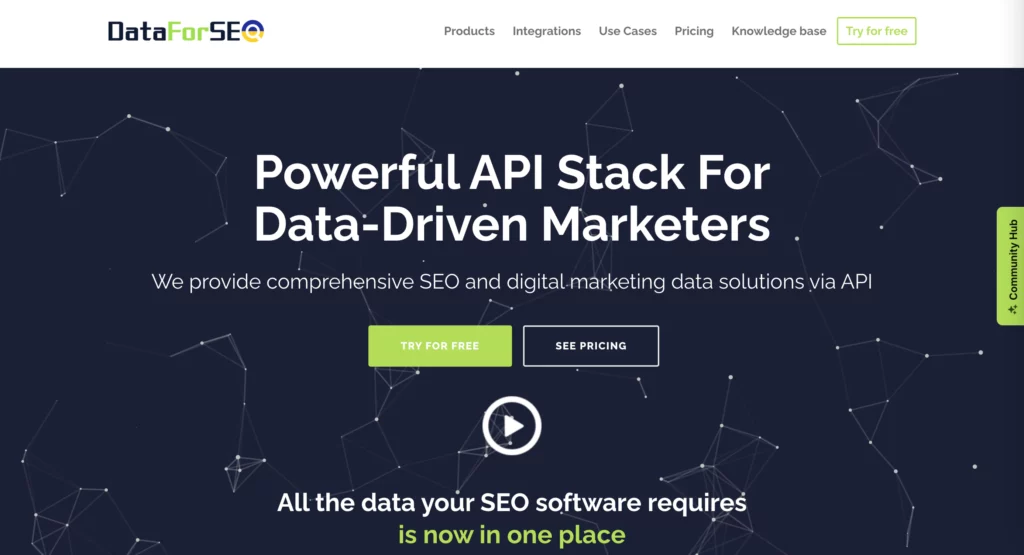
DataForSEO is a comprehensive API stack that helps resolve digital marketing and SEO-related problems based on data. Its SERP API uses a proprietary system of trustworthy proxy pools and extensive server infrastructure to offer you real-time SERP data retrieved from a wide range of databases, like Google and Bing SERPs.
Thanks to its intuitive tooling, you can leverage the service without coding knowledge. Also, it offers detailed documentation that explains how the API works, as well as GUI tools to monitor what’s going on (e.g., how many requests you’ve made or your API limits). Besides, the system can handle more than 607 million Google SERP per day with a 99.95% uptime guarantee. This makes the service ideal for scaling from small projects to enterprise-wide usage.
In addition to these features, DataForSEO’s SERP API can allow you to:
- Capture data back in 2019, which is useful for benchmarking and trend analysis.
- Deliver results within 6 seconds or less
Pricing
DataForSEO offers the pay-as-you-go pricing method. API-based pricing varies based on how fast you want to get results and how many additional details you want to include in your query.
- Standard Queue: $0.0006/SERP page (turnaround uptime of up to 5 minutes)
- Priority Queue: $0.0012/SERP page (turnaround uptime of up to 1 minute)
- Live Mode: $0.002/SERP page (turnaround uptime of up to 6 seconds)
Adding extra components (like AI Summary endpoints, Screenshot endpoints, or YouTube SERP API), parameters, and the number of search engine results can increase your final cost. Further, the company requires $50 as a minimum payment amount.
3. Zenserp
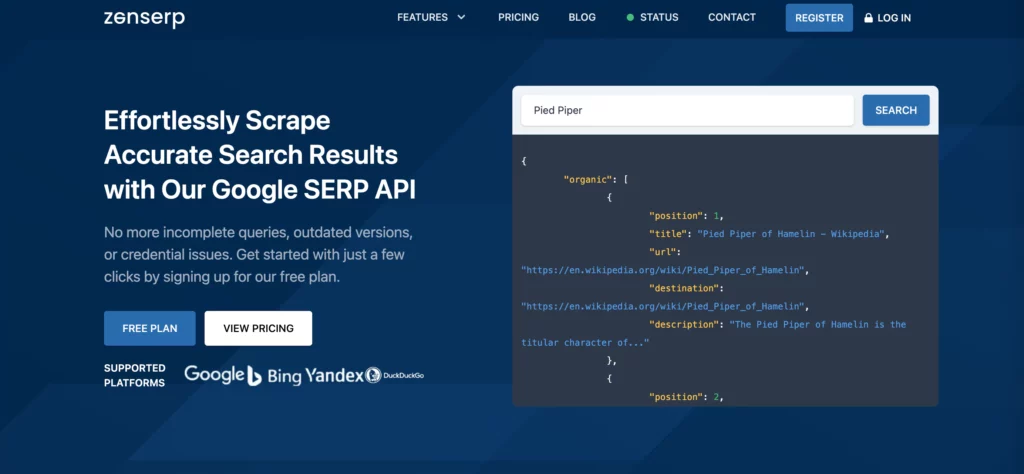
Zenserp is developed for simplicity with a developer-friendly dashboard and clear documentation with code samples in different programming languages (e.g., Python, Ruby, or Golang) for seamless integration into your system. The service also offers a shortcut by using Postman to help developers test and explore APIs without coding, making it easy to see all the endpoints and run example requests immediately. Premium paid plans also come with concierge onboarding and a dedicated account manager for those who want a smooth setup.
Zenserp is a great choice for scalability as it offers a robust infrastructure that supports real-time scraping and processes millions of API requests per day. It also guarantees 99.9% uptime to offer precise, trustworthy search results from all the search engines.
Some of its unique selling points include:
- An extensive request builder to transform your queries into production-ready code snippets.
- Highly scalable performance, no matter how high your volume is.
- Full snippet coverage and new SERP snippets that are consistently updated when they’re added by search engines.
- Global, geolocated results.
- Email notifications when your monthly usage reaches 90% and 100%, giving you enough time to adapt your plan and avoid interruptions.
Pricing
Simple and Economical pricing:
- Free for 50 searches/month
- Small with $$49.99 /month and 5K searches
- Medium with $129.99 /mo and 20K searches
- Large with $249.99 /month and 50K searches
- Very Large with $499.99 /month and 120K searches
High-Volume pricing:
- Premium with $699.99 /month and 250K searches
- Professional with $1,399 /month and 750K searches
- Enterprise with $1,599 /month and 1M searches
4. Apify SERP Scraper
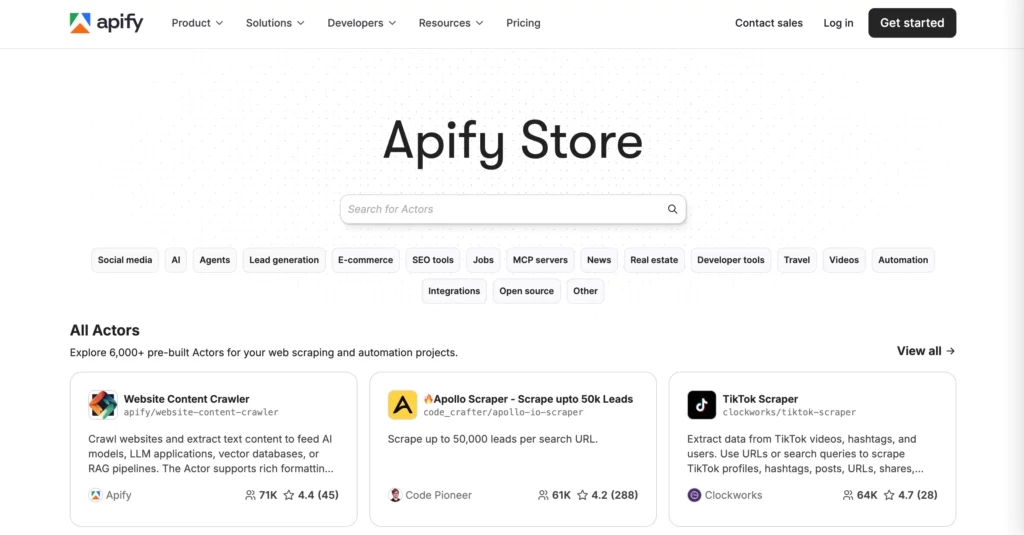
Apify provides a huge collection of ready-to-use scrapers (called Actors) with more than 6,000 templates for your web scraping and automation projects. These scrapers allow non-experts to access various search engines, typically Google, to extract a broad spectrum of data, like organic links, paid results, featured snippets, ads, AI overviews, video listings, and more. Additionally, Apify offers JavaScript or Python SDKs for developers to write custom logic, as well as provides popular tools (e.g., Slack or Google Sheets) to seamlessly integrate scraped data into their workflows.
Apart from these features, Apify SERP Scrapers are well-known for:
- Their ability to process huge workloads of an estimated 4 billion web pages monthly with 99.95% uptime.
- Anti-blocking measures (e.g., auto proxy rotation or random user-agent strings) to maintain near-human behavior and keep results consistent.
- Their ability to simulate a real web browser by using headless Chrome or Chromium to reliably load JavaScript-based pages and get complete, accurate results.
- Strict compliance with industry standards (e.g., GDPR, CCPA, or SOC2)
- Their robust infrastructure that supports distributed scraping, proxy management, scraping executions, and scalability without the need to reconfigure the system.
Pricing
- Free plan with $5 free credits used to run Actors, compute power, proxies, and storage (equivalent to $0.4/compute unit).
- Starter with $39/month (or $0.4/compute unit)
- Scale with $199/month (or $0.3/compute unit)
- Business with $999/month (or $0.25/compute unit)
- Enterprise: custom pricing
The final cost will increase if you integrate Apify’s add-ons into your plan. These add-ons include:
- Concurrent runs (allowing multiple instances of a scraper to run simultaneously): $5/run
- Actor RAM (memory amount used by a scraper during its execution): $2/GB
- Datacenter proxy (non-residential IPs from data centers for automation tasks or less-protected web scraping): from $0.6/IP
- Priority support (faster response times & dedicated support): $100
- Personal training: $150/hour
5. Bright Data (formerly Luminati)
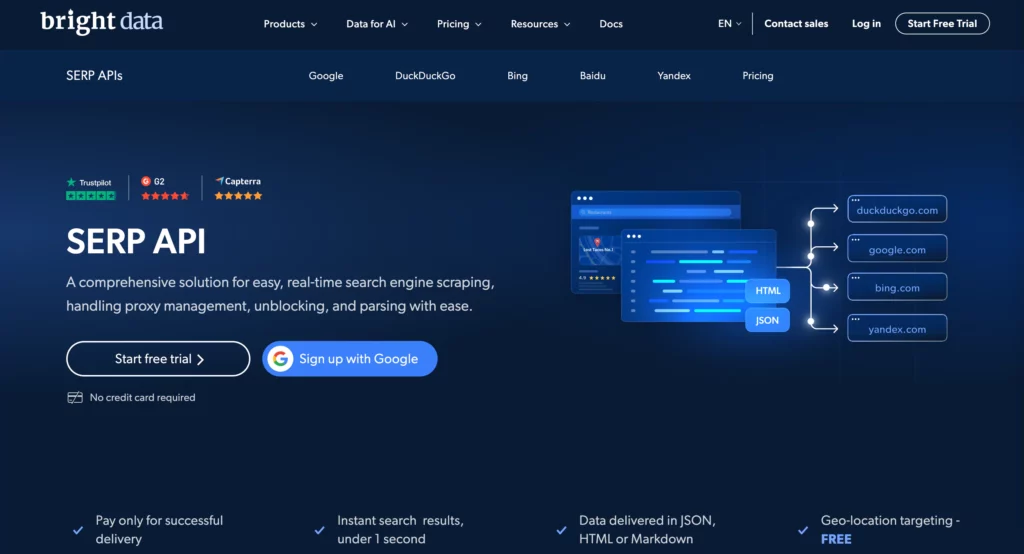
Bright Data’s SERP API helps you handle the hard work, like automated proxy management, JavaScript rendering, CAPTCHA solving, browser fingerprinting, and IP rotation. Further, it automatically adapts to changes in search engine structures, prevents IP blocking, and extracts correct, reliable data all the time. The service also uses a vast proxy network that complies with legal standards, such as GDPR or CCPA.
Bright Data’s SERP API allows you to access a massive IP pool across 195 countries by using different search parameters, like keywords, data types, geolocation, or languages. It’s developed for high volumes of requests with 99.99% uptime for different use cases, from SEO tracking and price comparison to ad intelligence. The results will be returned in JSON or HTML format for easy integration into any platform.
Pricing
All of Bright Data’s paid plans now come with a free trial:
- Pay as you go: $1.5 for 1K results
- Growth: $1.3 for 1K results or $499/month
- Business: $1.1 for 1K results or $999/month
- Premium: $1 for 1K results or $1,999/month
- Enterprise: custom pricing
6. Oxylabs SERP Scraper API
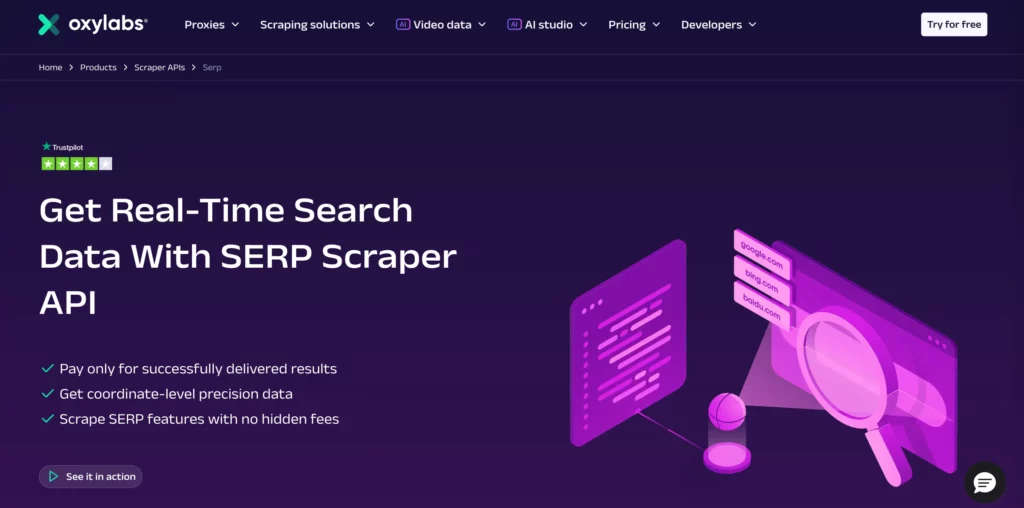
Oxylabs is one of the world’s largest proxy service platforms. It offers premium proxy solutions and web scraping tools to help your business retrieve data from different search engines and websites on a massive scale.
One of the outstanding products of Oxylabs is its SERP Scraper API. This service helps you discover various results from the most popular search engines like Google, Bing, Yahoo, or Yandex. Accordingly, you can offer the API with your preferred input parameters, like search query, localization, and interface language, to get timely and reliable data in HTML or structured JSON format.
Oxylabs features OxyCopilot, an AI-powered assistant, to simplify SERP scraping workflows. By entering your prompt in the Scraper API Playground, this intelligent bot will instantly generate code to scrape queries and parse instructions. This reduces manual coding from SERP data extraction.
In addition, Oxylabs SERP Scraper API comes with a variety of smart features to collect real-time data seamlessly. These features include:
- Automatically choosing and rotating proxies across 195 countries by using machine learning.
- Rendering JavaScript-based content with only one line of code.
- Generating AI-driven fingerprints (HTTP headers, JavaScript behavior, and browser signals) to avoid scraper blocking.
- Automatically retrying and bypassing CAPTCHA to avoid interrupting data retrieval.
- Using machine learning to identify and adapt to different response formats.
- Scheduling automatic scraping tasks to run at specific times.
- Using XPath or CSS selectors to write your own parsing logic for exact data retrieval.
Pricing
- Free for 2,000 results
- Micro with $49 + VAT/month (for 98,000 results)
- Starter with $99 + VAT/month (for 220,000 results)
- Advanced with $249 + VAT/month (for 622,500 results)
7. ScraperAPI
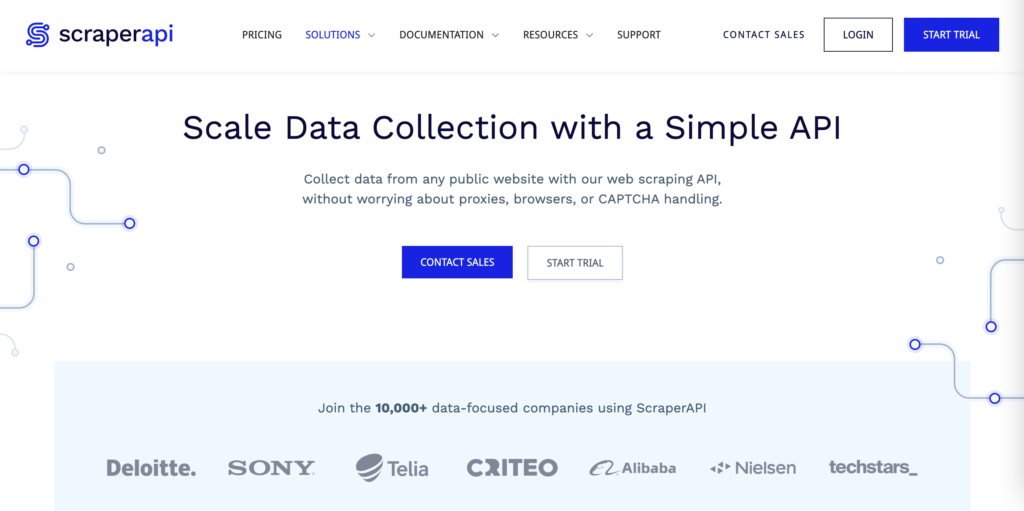
ScraperAPI is a cloud-based scraping tool that allows both startups and large enterprises to extract data from search engines and other websites.
Its SERP Scraper API is highly recommended for its ease of use. Accordingly, the service handles the complexities of SERP scraping with advanced features like smart IP & header rotations, advanced anti-bot bypassing, fingerprint management, and CAPTCHA handling. This allows it to stay 100% GDPR and CCPA compliant while retrieving reliable, accurate SERP data formatted in JSON or CSV files.
Further, this SERP scraping tool supports customizable requests, from rendering JavaScript-based content and targeting specific geolocations to customizing HTTP headers. Have no coding background? Don’t worry! Select the Google Search template in DataPipeline to build an entire scraping process and let the tool automate search engine scraping in a few clicks.
The tool uses a simple Post() request to handle small to massive workloads at a near 100% success rate. Further, you can scale your data extraction for even the toughest domains with its Async Scraper service without requiring infrastructure management, which makes it ideal for scalable projects.
Pricing
All of ScraperAPI’s paid plans cover a 7-day free trial with 5,000 API credits:
- Hobby: $49/month with 100K API credits (for only US & UK regions)
- Startup: $149/month with 1M API credits (for only US & UK regions)
- Business: $299/month with 3M API credits (for all countries)
- Scaling: $475/month with 5M API credits (for all countries)
- Enterprise: custom pricing
8. Netnut
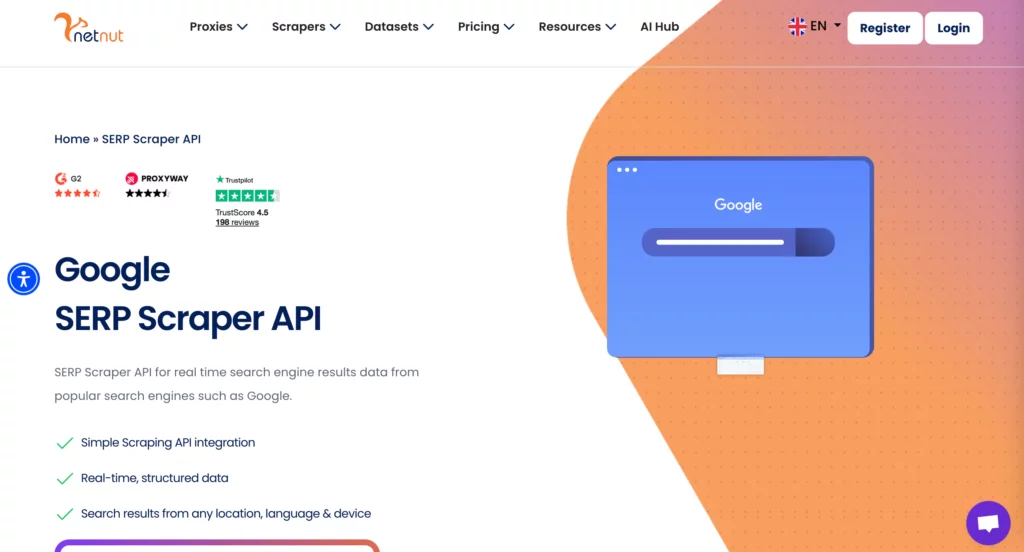
Netnut is one of the best web data providers that offer top-notch proxy solutions, scraping tools, and datasets. Its SERP Scraper API allows you to fetch search engine results (e.g., keywords, ads, news, or images) from popular sites, like Google, with high accuracy and success rate. Apart from customizable input parameters we often see in other SERP APIs (like domains, geolocations, or the number of results displayed), the tool also performs more precise searches with filters, like excluding adult content or auto-corrected results.
The SERP API is reported to have a quick setup and an intuitive interface, designed to process massive volumes of queries effectively. Beyond that, it’s backed by a huge residential IP network across 195 countries with support from more than 200 ISP partners. This makes it ideal for large-scale SEO or market analysis projects that require high reliability.
In addition to these features, Netnut is a good option due to its powerful infrastructure that allows for zero CAPTCHA and no IP blocks. Further, it supports multilingual searches and integrates AI to accelerate data collection.
Pricing
All of Netnut’s paid plans come with a 7-day free trial:
- Production: $1.2/1K queries or $1,200 for 1M queries per month
- Semi-Pro: $0.72/1K queries or $7,200 for 10M queries per month
- Professional: $0.5/1K queries or $25K for 50M queries per month
- Master: $0.4/1K queries or $40K for 100M queries per month
9. SearchApi.io
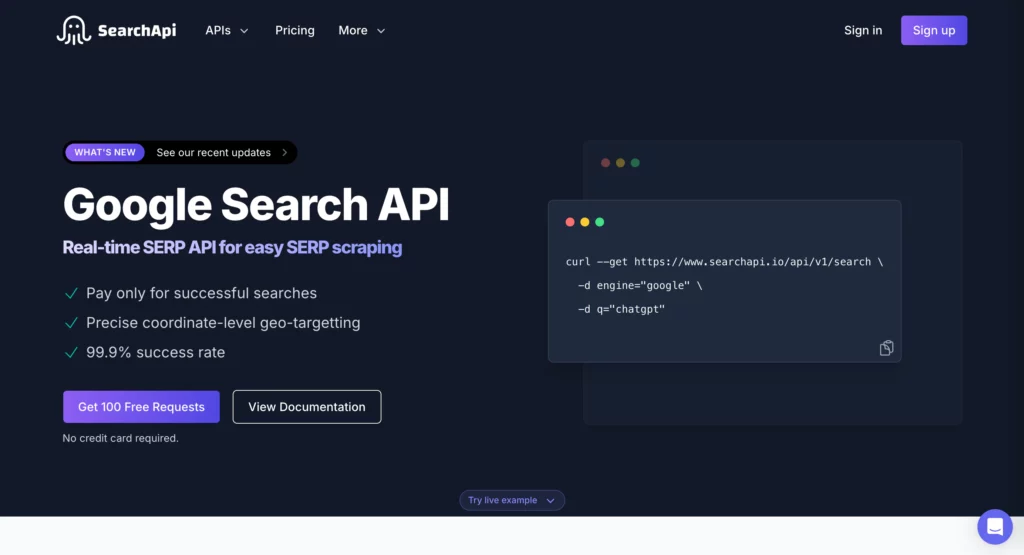
SearchApi.io provides a wide range of SERP APIs to scrape multiple search engines and fetch real-time SERP data (e.g., ads, featured snippets, or product listings) in structured JSON. Its APIs guarantee high reliability and accuracy with a 99.9% uptime SLA, even when you want to extract precise geo-targeting data.
The service also boosts developer experiences by allowing easy integration into your systems through a GET HTTP request, with code examples for different programming languages. Its interactive playground also helps you test queries and view responses instantly in these languages, making the service ideal for discovery and debugging. Moreover, SearchApi.io also offers clear documentation, detailed parameter support, and comprehensive metadata in responses. This helps developers use the tool easily.
Like other best SERP APIs, SearchApi.io supports scalable projects and comes with a US Legal Shield to ensure compliant use. With its robust infrastructure, you don’t need to worry about heavy work, as it helps you:
- Guarantee complete data retrieval and scalability with built-in auto-retry mechanism and adaptive error handling.
- Perform an advanced CAPTCHA bypass to avoid uninterrupted data scraping.
- Integrate with common open-source tools (e.g., LangChain, Haystack, or Dify) to expand functionality without complex setup.
Pricing
Upon subscription, you’ll receive a free account with 100 free searches. Upgrade to the following paid plans when your demand evolves:
Regular pricing
- Developer: $40/month for 10K searches
- Production: $100/month for 35K searches
- BigData: $250/month for 100K searches
- Scale: $500/month for 250K searches
High volume pricing (Octo plans)
- 500K: $900/month for 500K searches
- 1M: $1,500/month for 1M searches
- 2M: $2,800/month for 2M searches
- 5M: $5,000/month for 5M searches
Note: The pricing packages above are charged for standard speed. The costs will double if you choose an enhanced speed service.
10. Scrapingdog
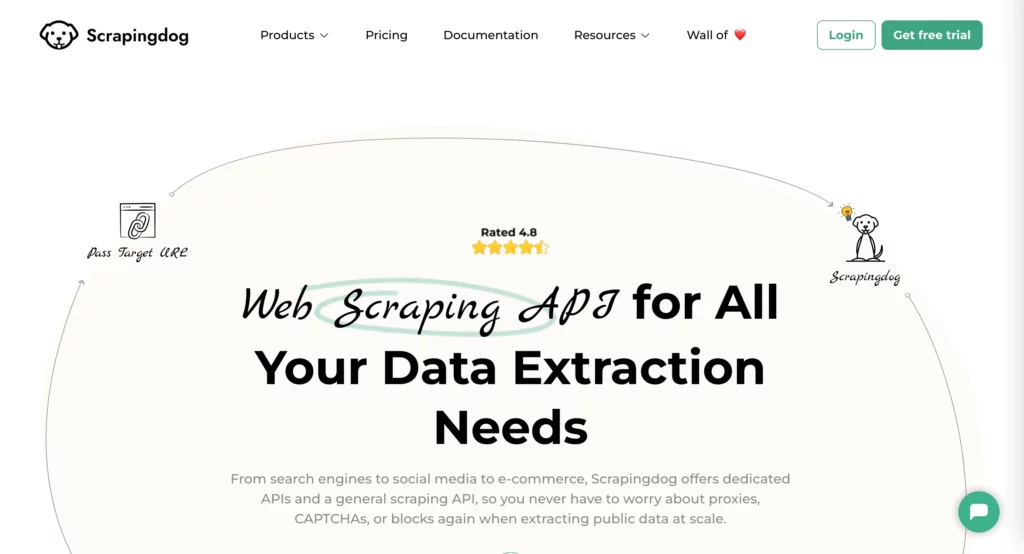
Scrapingdog is a web scraping service that allows you to extract data from Google Search, Bing Search, Amazon Product Data, and other search engines. It offers numerous dedicated APIs that can process over 400 million requests monthly without compromising performance and reliability. The results are returned in LLM-ready Markdown or JSON formats.
The service takes care of challenging tasks, making data collection and retrieval effortless for you. Particularly, it can:
- Use various instances of headless browsers to render JavaScript-heavy content, ensuring the fetched data aligns with what real users view.
- Switch between 40M+ proxies to bypass the rate limit, avoid blockage, and achieve successful outcomes.
- Automatically adapt its APIs to the layout changes of search engines.
Its APIs are easy to use with a clear, intuitive dashboard where even non-coders can paste a URL, pick input parameters, and start extracting their desired data. The service also integrates a visual scraper builder to configure APIs without writing code, as well as support multiple languages through REST-style API integration.
Pricing
Upon signup, your account will receive 1,000 free credits for a 30-day free trial. Upgrade to the following paid plans when your demand changes:
- Lite: $40/month for 200K credits
- Standard: $90/month for 1M credits
- Pro: $200/month for 3M credits
- Premium: $350/month for 6M credits
How to Choose the Best SERP API?
When the demand for extracting real-time data increases, the number of SERP API providers grows accordingly. But among a huge pool, which is the best SERP API you should choose? Consider your specific requirements beforehand to identify how and where a SERP API can benefit your business or team. Then, consider the following criteria to reach the perfect fit:
Accuracy & reliability of results
Data quality can affect your later usage, whether for brand protection, ad intelligence, search engine rankings, or price comparison. That’s why a good SERP API must handle challenging parts (e.g., solving CAPTCHA or preventing IP blockage) effectively to scrape reliable, precise data.
Speed & scalability
Your chosen API must handle hundreds or millions of requests without interruptions. Therefore, opt for providers that guarantee low latency and high speed, even when your search volumes and demands grow. If those providers leverage proxy pools or AI-powered proxy rotation to support speed and reliability at scale, it’s a plus.
Data coverage
A good SERP API must extract any type of data you want. The data shouldn’t be limited to organic and paid results, but extend to images, product displays, videos, maps, and more.
API pricing & free trial availability
Providers offer varying pricing models based on processing speed, request volumes, and even add-ons. Ensure the cost fits your expected usage and budget. Besides, you should select the providers with transparent pricing plans and at least free trials to test speed and precision before you make a long-term commitment.
Ease of integration
The final factor to consider is whether the API integrates seamlessly with your existing systems and other tools (e.g., LangChain). If integration is complex, you’ll waste a lot of development and maintenance time. Not to mention that the poor integration can lead to incomplete or incorrect data collection. So, opt for the providers whose API works well with your infrastructure and that offer good documentation and examples to make integration simpler.
FAQs
Is SERP API good?
Yes. An SERP API is a good option if you want to access, gather, and retrieve search engine results cost-efficiently and immediately. The tool handles all technical aspects of data scraping. This allows you to fetch reliable, accurate SERP data (e.g., organic or featured snippets) based on your specific queries without worrying about infrastructure limitations or compliance violations. For this reason, it’s ideal even when your search demand increases.
Can SERP APIs replace SEO tools like Ahrefs or SEMrush?
No, because both serve different aspects of digital marketing. Ahrefs or SEMrush offer a range of features to cover different SEO aspects, including keyword research, backlink analysis, competitor analysis, and more. SERP APIs, meanwhile, don’t offer those features and lack analytics capabilities. They just enable the real-time retrieval of SERP data from a search engine’s database. And you still need to depend on other SEO tools to implement digital marketing and SEO-related tasks, like analyzing a competitor’s pricing strategy or ads campaigns.
Why is SERP API so expensive?
SERP APIs may be expensive for several reasons. First, they require robust infrastructure to process large volumes of search requests, ensure data accuracy and speed, as well as handle other technical things. Second, when search engines change their algorithms and website structures, SERP APIs need to be upgraded to deal with these changes and continuously offer accurate, reliable results. Third, the complexity and diversity of your requirements (e.g., short turnaround time, scalability, or extra components like AI) also contribute to your overall costs.
Is SERP API free to use?
No, most SERP APIs aren’t free to use, but they offer free tiers or trials to test their service. These tiers are limited to the number of searches and some advanced features.



Attractive section of content I just stumbled upon your blog and in accession capital to assert that I get actually enjoyed account your blog posts Anyway I will be subscribing to your augment and even I achievement you access consistently fast
Usually I do not read article on blogs however I would like to say that this writeup very compelled me to take a look at and do it Your writing style has been amazed me Thank you very nice article
I just wanted to express my gratitude for the valuable insights you provide through your blog. Your expertise shines through in every word, and I’m grateful for the opportunity to learn from you.
I do agree with all the ideas you have introduced on your post They are very convincing and will definitely work Still the posts are very short for newbies May just you please prolong them a little from subsequent time Thank you for the post